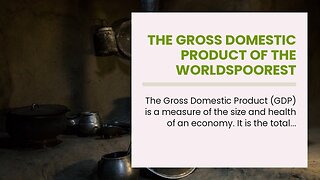GDP by Country and World | 1970-2021, current USD, World Bank
This video shows top 20 countries by Gross Domestic Product (GDP) and world GDP from 1970 to 2021, measured in current US Dollars, by World Bank.
USSR is not part of this rank, but Russian federation from 1989.
Gross Domestic Product (GDP) is a crucial economic indicator that measures the value of all goods and services produced within a country's borders. In this article, we will delve into the concept of GDP by country, explore the significance of measuring GDP in current US Dollars, and provide a brief summary of its evolution from 1970 to 2021.
GDP by country represents the total value of all final goods and services produced within a nation during a specific period. It is a measure of economic activity that allows comparisons between countries and serves as an indicator of a nation's economic health. GDP includes consumer spending, government expenditure, business investments, and net exports (exports minus imports).
When GDP is measured in current US Dollars, it means that the values are expressed in terms of the purchasing power of the US currency at the time of measurement. This allows for international comparisons and provides a standardized unit for evaluating the economic performance of different countries. By using current US Dollars, fluctuations in exchange rates between different currencies are taken into account. This approach enables economists and policymakers to gauge the relative economic strength and performance of nations more accurately. It helps to eliminate the distortion caused by exchange rate fluctuations and provides a common currency denominator for international comparisons.
GDP has undergone significant changes and fluctuations over the years, influenced by a range of factors, including economic policies, technological advancements, geopolitical events, and global economic trends.
During the 1970s, the world experienced multiple oil crises, leading to soaring oil prices and high inflation rates. These events significantly impacted GDP growth, as economies struggled with increased energy costs and reduced purchasing power. The global economy faced a recession in the early 1980s due to restrictive monetary policies aimed at combating inflation.
In the 1990s, the rise of information technology and globalization played a crucial role in boosting GDP growth. Technological advancements spurred productivity gains, while the liberalization of trade and investment opened up new opportunities for economic expansion. Many developing countries experienced rapid GDP growth during this period.
The 2008 global financial crisis had a profound impact on the global economy. It originated in the United States with the collapse of the housing market and spread worldwide, causing a severe recession. GDP growth rates declined significantly in many countries, leading to job losses and economic turmoil.
In recent years, the world has faced various challenges, including trade tensions between major economies, political uncertainties, and the COVID-19 pandemic. The pandemic, in particular, had an unprecedented impact on global GDP. Lockdown measures, travel restrictions, and supply chain disruptions caused a sharp contraction in economic activity.
However, as vaccination efforts progress and economies reopen, GDP has shown signs of recovery. Governments and central banks have implemented substantial fiscal and monetary stimulus measures to revive economic growth. The extent of the recovery and the pace of GDP growth will depend on multiple factors, including vaccine efficacy, consumer confidence, and the ability of businesses to adapt to new market conditions.
GDP by country is a vital measure of a nation's economic performance, reflecting the value of goods and services produced within its borders. Expressing GDP in current US Dollars facilitates international comparisons and eliminates the distortions caused by exchange rate fluctuations. Understanding the factors that influenced GDP over time provides insights into the complex dynamics of economic growth.
Music:
Punch Deck - Homestead
https://soundcloud.com/punch-deck/homestead
Special intro background by NCF https://www.youtube.com/@NoCopyrightFootages
Data visualization created with flourish.studio
-
 0:34
0:34
Gen Z News
1 year agoWorld Bank Reports Global GDP Growth Slowdown: First Time Below 3.0% Since 2009 and 2020 Recessions!
11 -
 11:47
11:47
AV
8 months ago#279 Gross Domestic Product (GDP)
17 -
 5:06
5:06
FineTimer
1 year agoThe Gross Domestic Product of the Worldspoorest Countries.
38 -
 0:37
0:37
Wealthion
1 year agoThe Global Dominance of the US Dollar
1861 -
 6:20
6:20
Hubertmanalo08
1 year agotop 10 countries with Reserve Gold
38 -
![BankAmericard, Cashless Agenda Before Special Drawing Rights: artificial [global] currency](https://hugh.cdn.rumble.cloud/s/s8/1/8/U/k/x/8Ukxl.0kob-small-BankAmericard-The-Cashless-.jpg) 25:24
25:24
BrookeCerda
10 months agoBankAmericard, Cashless Agenda Before Special Drawing Rights: artificial [global] currency
2312 -
 5:00
5:00
BetterWithBitcoin
1 year ago"US Debt to GDP will continue to rise" - Chamath Palihapitiya on the US Dollar's Store of Value
16 -
 14:19
14:19
SRU
1 year ago $0.02 earnedThe Dollar Is Once Again The World's Problem - Chinese State Urges De-Dollarization - A Rising Trend
141 -
 4:10
4:10
GREAT BRANDS GLOBAL
1 year agoRichest Countries Worldwide | Rankings by GDP Size
9 -
 14:15
14:15
SRU
1 year ago $0.01 earned$29 Trillion Stripped From World Economy! How Much Has The Fed Monetary A$$ault Cost The US & World
144